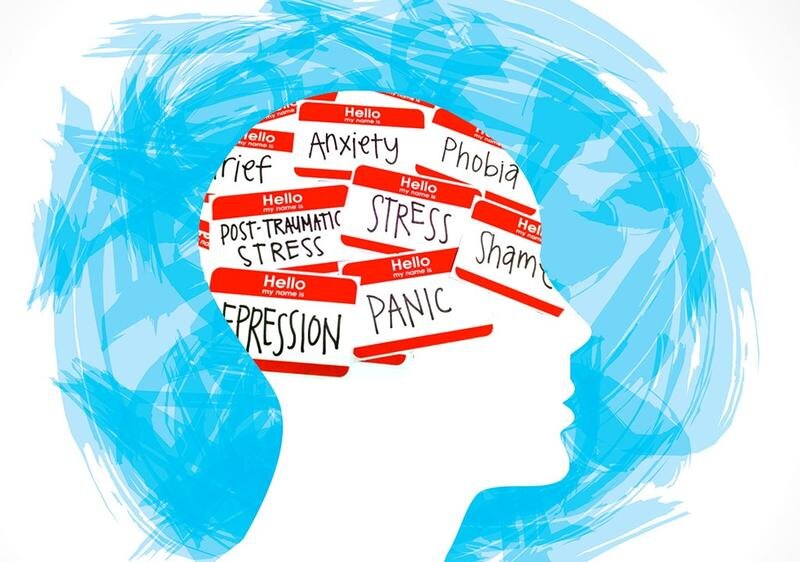Accepting your mental illness does not mean a loss of faith
Creative Commons illustration by Saul Albert.
(OPINION) I'm a postdoctoral researcher, teacher, mental health advocate, and freelance writer. I've been a Christian my whole life, being born and raised in Nigeria in a Christian family. I spent my childhood in the comforting rituals of Catholicism but also societally bombarded with the heavy-handed messages of mid-90's Northern Nigerian Pentecostalism. I've also lived with mental illness (generalized anxiety disorder and OCD) from my earliest memories, with my first anxiety peak at the age of 15.
My nearly 34 years of life have been split between Bauchi, Nigeria, Johannesburg, South Africa, and now the United Kingdom. In my adult life I’ve always been a practicing Christian, if practicing means still clinging to my faith even when I didn’t attend church, and I’ve had the chance to join church communities in different cultural contexts. I’ve seen the good and the extreme, especially when it comes to how mental illness is perceived, handled, and “treated.”
My first encounter with counseling came in Johannesburg in 2007, with a delightful Christian woman who availed her comfort and expertise to me, at no cost, when I experienced an identity crisis that I feared might claim my life. Prior to this, while my nuclear family was made up of deeply reflective individuals, I had hidden the extent of my mental torture from them. This meant that the majority of information on mental health that I consumed was what I could glean from any reading, news commentary, and documentaries.
The “comfort” I sought was in church practice. Unfortunately, one of the messages that my already-anxious mind held steadfast to was that if you have enough faith then you should be healed of any and every affliction. Apparently, my faith was less than a mustard seed because no matter what I tried and how much I prayed, my mental illness only got worse. The pressure I was placing on myself only served to stigmatize and abnormalize me.
Only when I returned to Nigeria for the 2007 Christmas holiday did I have the courage to start openly speaking to my parents about my mental illness, and to seek counseling with a pastor who remains close friends with the family till this day. This openness signaled a turn in how I handled my mental health, as suddenly my parents started sharing bits about their own mental health, and my pastor engaged me in conversations about Jesus’ care and love for those of us with mental illness.
The years following were still steeped in highs and lows, dramatic dips, shame, and inner confusion about how best to handle my new normal, which was an acceptance that I am and probably will always be mentally ill. My foray into mental health advocacy began between 2008 to 2009 and was initially a mechanism of defense: I figured that if I owned up to my mental illness, which could explain certain “odd” behaviors of mine, then no one could use it against me. Looking back, I bear no ill will towards this approach because I realize that my younger self simply did not have the energy to do deeper introspection.
My twenties were enveloped by this anxiety, but also by growth. I finally realized that to get where I needed to be, which I defined as a space where I could live in some form of mental balance, I would need to accept where I was, as ugly as it felt. It took years for me to get comfortable with naming my fears, almost as though naming them would legitimize them and give them absolute freedom to wreak havoc within me. On the contrary, what I found was that naming them was actually the first step in me gaining back some of my mental ground.
My move to the United Kingdom in 2013 was another new and exciting chapter in my life. I had been awarded a fully-funded PhD scholarship, and this would be my first time of living alone. The four years of my PhD comprised a period of church non-attendance, but a deeper faith. By this time, even with my anxiety roller-coaster, I started becoming familiar with how my system operated and putting checks and balances in place to help myself cope.
It was only at the end of my PhD that I was finally diagnosed, probably taking so long because of a mixture of me still being wary of clinical help and also not having a definite plan for how I wanted to handle my own mental health. Unfortunately, extenuating circumstances (including my father’s unexpected death) forced my hand. Still, the act of asking for help was another win for me, one I wish I’d done sooner. I have now been on medication for the past three years, and am committed to speaking about how much this intervention has helped me. In all of this I've found the hope to keep looking for improved coping mechanisms that work for me.
I spent so many years caught in a cycle of trying to pray away my mental illness, only to reap frustration. I do not want anyone else to have to go through that pain, and I also don’t want this to mean giving up on the faith we profess. Faith gives us hope for a journey towards mental and spiritual healing, but that does not mean that healing always exists as a destination within this realm of life. Still, we can use this faith to bolster our coping mechanisms, to focus our meditation and reflexive practice, as a safe space to be honest with our God about our pains and frustrations, and as a reminder that we have every right to ask for help from experts.
Furaha Asani is a researcher, writer and mental health advocate. She’s written for the Guardian, Huffpost, New Scientist, Travel Noire, Black Ballad, Stylish Academic, and Times Higher Education, among other outlets.

